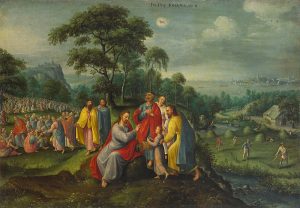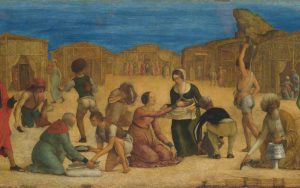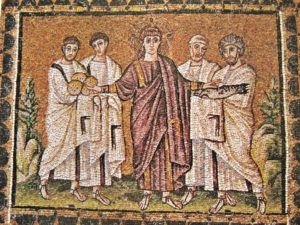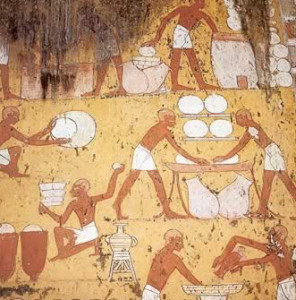Thoughts on Sunday’s Lessons for July 28, 2024 (Pentecost 10B/Proper 12)

Feeding the Five Thousand (c.1580-590), oil painting on canvas by Marten van Valckenborch (1535-1612). Kunsthistorisches Museum, Vienna, Austria. (Click image to enlarge.)
First Reading (Track One): 2 Samuel 11:1-15
Power corrupts. We see this simple wisdom amply demonstrated in the life of David. For all the reverence that David earned through his kingship and warrior victories, when he was bad, he was very, very bad. We see this in Sunday’s horrifying Track One first reading: He is so attracted by the sight of beautiful Bathsheba bathing on her roof that he summons her, rapes her – no kinder term will serve for a person with his power taking her without her consent – and then arranges for the death of her husband, Uriah, in battle.
First Reading (Track Two): 2 Kings 4:42-44
The story of the Prophet Elisha in our Track Two first reading might make us think of the familiar gospel story about Jesus encountering feeding a hungry crowd of thousands with a few loaves and fishes. As told in the Second Book of Kings, Elisha, faced with a crowd of hungry people, directs that they be fed from a sack of food that a man has brought to sacrifice. There were only 20 loaves and a bit of grain to share among 100 people, which surely didn’t seem like enough. But with God’s help it proved to be more than enough. Just as in the Gospel stories, there were even leftovers after all were fed.
Psalm (Track One): Psalm 14
Psalm 14, another of the many Psalms that tradition attributes to David himself, resonates with David’s heinous behavior in the first reading. The Psalmist, speaking in the voice of a disappointed king, laments that the people have turned faithless and corrupt, foolishly denying God as they commit abominable acts. God looks down to see if any wise people remain, but there are none. Yet even in these times of evil, the Psalmist sings, God remains with the righteous. God is the refuge of the just, and eventually will deliver the people and restore their fortunes.
Psalm (Track Two): Psalm 145:10-19
Like many of the Psalms, this hymn of praise and thanksgiving expresses gratitude to a God who is not only powerful but faithful and merciful too. God is always prepared to gently lift up those who fall and to support those who are oppressed, we hear in this portion of Psalm 145. Echoing the bounty that God provided for the hungry people in the Ezekiel reading and the hungry crowd that Jesus feeds in the gospel stories, the Psalmist, too, celebrates God who gives us food; whose outstretched hands satisfy every living creature.
Second Reading: Ephesians 3:14-21
Sunday’s passage from the letter to the Ephesians takes a break from its pastoral advice to an early Christian community as the author kneels before God to lift up a prayer for the people being addressed. He prays that the people of Ephesus may receive strength through the Holy Spirit, and that Christ may come to live in their hearts through faith. The reading closes with a beautiful blessing that we often hear slightly reworded as a benediction in Morning and Evening Prayer: “Glory to God whose power, working in us, can do infinitely more than we can ask or imagine.”
Gospel: John 6:1-21
Beginning Sunday and continuing through the month of August, our gospel readings will turn from Mark’s Gospel to the sixth chapter of John’s Gospel, in which we hear Jesus discourse at length about the bread of life. This first portion gives us John’s version of the familiar story of the loaves and fishes, which hints at the Eucharist in its imagery: Jesus first blesses the bread, then shares five barley loaves and two fish among 5,000 people. Somehow this tiny portion feeds everyone so abundantly that there is more left over than they had to start with. The crowds are so amazed that they clamor to make Jesus king, but he slips away, catching up with the startled disciples by walking miles across the choppy water to join them in their boat.



